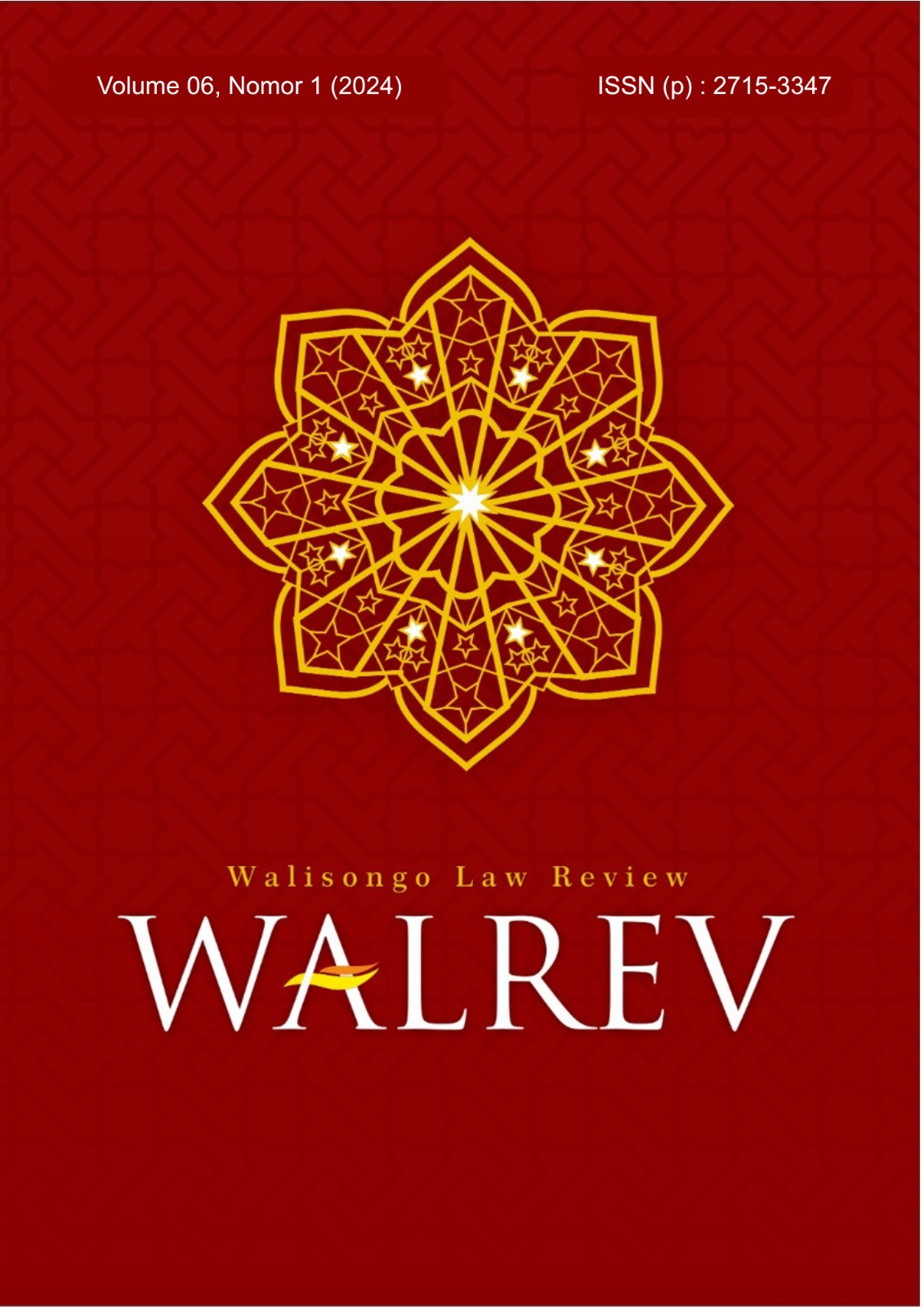Justice, Equality, and Indonesian Labor Law: Navigating Humanitarian Challenges in the Workplace
DOI:
https://doi.org/10.21580/walrev.2024.6.1.21746Keywords:
Human Right, Labor Law, justiceAbstract
The increasing complexity of labor relations in Indonesia has led to widespread inequality, discrimination, and human rights violations in the workplace. These conditions underscore the urgent need for stronger legal protections to ensure justice and equality for all workers. This article examines the humanitarian challenges arising from the expanding labor force, which has weakened workers’ bargaining power and increased their vulnerability to exploitation by employers. As the primary policymaker, the government bears the constitutional obligation to protect workers and uphold human rights, as mandated by the 1945 Constitution of the Republic of Indonesia. Employing a non-doctrinal research approach with a normative perspective, this study utilizes documentation and literature as primary data sources. The findings reveal that equality and justice within Indonesia’s labor system have not been fully realized. The legal transition from Law No. 13 of 2013 on Manpower to Law No. 6 of 2023 on Job Creation further underscores disparities in labor relations, as workers continue to face structural vulnerabilities. Common forms of injustice include discrimination in recruitment and workplace practices, harassment, intimidation, labor exploitation, violations of occupational health and safety standards, unfair wage systems, and neglect of workers’ rights during termination of employment. These findings emphasize the urgent need for comprehensive labor law reform to ensure fairness, dignity, and the protection of fundamental rights for all workers.
Meningkatnya kompleksitas hubungan industrial di Indonesia telah menimbulkan ketimpangan, diskriminasi, dan pelanggaran hak asasi manusia di lingkungan kerja. Kondisi tersebut menegaskan urgensi penguatan perlindungan hukum guna menjamin keadilan dan kesetaraan bagi seluruh pekerja. Artikel ini mengkaji tantangan kemanusiaan yang muncul akibat meningkatnya jumlah tenaga kerja, yang berimplikasi pada melemahnya posisi tawar pekerja dan meningkatnya kerentanan terhadap eksploitasi oleh pemberi kerja. Sebagai pembuat kebijakan utama, pemerintah memiliki kewajiban konstitusional untuk melindungi pekerja dan menegakkan hak asasi manusia sebagaimana diamanatkan dalam Undang-Undang Dasar Negara Republik Indonesia Tahun 1945. Dengan menggunakan pendekatan penelitian non-doktrinal melalui perspektif normatif, studi ini memanfaatkan dokumentasi dan kajian pustaka sebagai sumber data utama. Hasil penelitian menunjukkan bahwa prinsip kesetaraan dan keadilan dalam sistem ketenagakerjaan Indonesia belum sepenuhnya terwujud. Peralihan regulasi dari Undang-Undang No. 13 Tahun 2013 tentang Ketenagakerjaan ke Undang-Undang No. 6 Tahun 2023 tentang Cipta Kerja semakin menegaskan adanya disparitas dalam hubungan industrial, di mana pekerja masih menghadapi kerentanan struktural. Bentuk-bentuk ketidakadilan yang umum terjadi meliputi diskriminasi dalam rekrutmen dan praktik kerja, pelecehan, intimidasi, eksploitasi tenaga kerja, pelanggaran standar keselamatan dan kesehatan kerja, sistem upah yang tidak adil, serta pengabaian hak-hak pekerja saat pemutusan hubungan kerja. Temuan ini menegaskan perlunya reformasi hukum ketenagakerjaan yang komprehensif untuk menjamin keadilan, martabat, serta perlindungan hak-hak fundamental bagi seluruh pekerja.
Keywords: Human Rights, Justice, Equality, Labor Law, Humanitarian Challenges.
Downloads
References
Adawiyah, Robi’atul, M. Tanzil Multazam, and Rifqi Ridlo Phahlevi. 2017. “Union Busting Dalam Hukum Ketenagakerjaan Di Indonesia.” Indonesian Journal of Law and Economics Review 1(1). doi: 10.21070/ijler.v1i1.1744.
Ananta, Zulia Devi, Ari Puji Astuti, Putri Ananta Rahayu, Moh Jauhari Ibrahim, and M. Isa Anshori. 2024. “Memahami Tindakan Diskriminasi Di Tempat Kerja: Perspektif Hukum Dan Etika.” Trending: Jurnal Manajemen Dan Ekonomi 2(3):106–20. doi: 10.30640/trending.v2i3.2638.
Cholilalah, Rois Arifin, Aleria Irma Hatneny. 2021. Menyoal Kerja Layak Dan Adil Dalam Ekonomi Gig Di Indonesia.
Djakaria, Mulyani. 2018. “Perdagangan Perempuan Dan Anak Serta Tindak Pidana Korupsi Sebagai Kejahatan Transnasional Terorganisir Berdasarkan Konvensi Parlemo.” Jurnal Bina Mulia Hukum 3(1):1–14. doi: 10.23920/jbmh.v3n1.2.
Iristian, Yovan. 2023. “Pursuit of Fairness: Human Rights and Social Justice in Indonesia’s Legal Landscape.” Journal of Progressive Law and Legal Studies 2(01):34–48. doi: 10.59653/jplls.v2i01.530.
Kuahaty, Sarah Selfina. 2021. Hukum Ketenagakerjaan. Bandung: Widina Bhakti Persada.
Muktie, Javier Avila Pratama, and Eryx Sugiarto. 2024. “Revisi Undang-Undang Ketenagakerjaan Ke Dalam Undang-Undang Nomor 6 Tahun 2023 Tentang Cipta Kerja: Tinjauan Teori Utilitarianisme Dan Hedonistic Calculus.” Das Sollen: Jurnal Kajian Kontemporer Hukum Dan Masyarakat 2(1):1–25.
Mustari, Mustari, and Bakhtiar Bakhtiar. 2020. “Implementasi Nilai Kemanusiaan Dan Nilai Keadilan Pada Pekerja Perempuan (Analisis Terhadap Undang-Undang Ketenagakerjaan).” SUPREMASI: Jurnal Pemikiran, Penelitian Ilmu-Ilmu Sosial, Hukum Dan Pengajarannya 15(1). doi: 10.26858/supremasi.v15i1.13484.
Nurhayati, Tri. 2021. “Kajian Yuridis Sosiologis Terhadap Pemberlakuan Undang-Undang Nomor 11 Tahun 2020 Tentang Cipta Kerja Beserta Aturan Turunannya.” Jurnal Kertha Semaya 9(6). doi: https://doi.org/10.24843/KS.2021.v09.i06.p11
Sarira, Iron. 2021. “Justice as the Aim of/for Formation of Labor Law in Indonesia (A Review of Philosophy of Law).”
Solapari, Nuryati, Fakhry Amin, and Syahrul Alamsyah. 2023. “Philosophy Of Justice In Post-Modern Labor Law: What And How?” Jurnal Dinamika Hukum 23(2). doi: 10.20884/1.jdh.2023.23.2.3655.
Sunaryo, Sidik. 2023. “The Philosophy of Social Injustice for All Indonesian Laborers Set Forth in Job Creation Law.” Legality : Jurnal Ilmiah Hukum 31(1):112–23. doi: 10.22219/ljih.v31i1.25330.
Tjandra, Surya. 2016. “Labour Law and Development in Indonesia.” Universiteit Leiden. https://hdl.handle.net/1887/37576
Wijayanti, Asri. 2009. Hukum Ketenagakerjaan Pasca Reformasi.
The 1945 Constitution
Law of the Republic of Indonesia Number 13 of 2003 concerning Employment
Law of the Republic of Indonesia Number 6 of 2023 concerning Job Creation
Government Regulation Number 51 of 2023 concerning Wages
Downloads
Published
How to Cite
Issue
Section
License
Copyright (c) 2024 Tri Nurhayati, Raden Lungid Ismoyoputro

This work is licensed under a Creative Commons Attribution-ShareAlike 4.0 International License.










